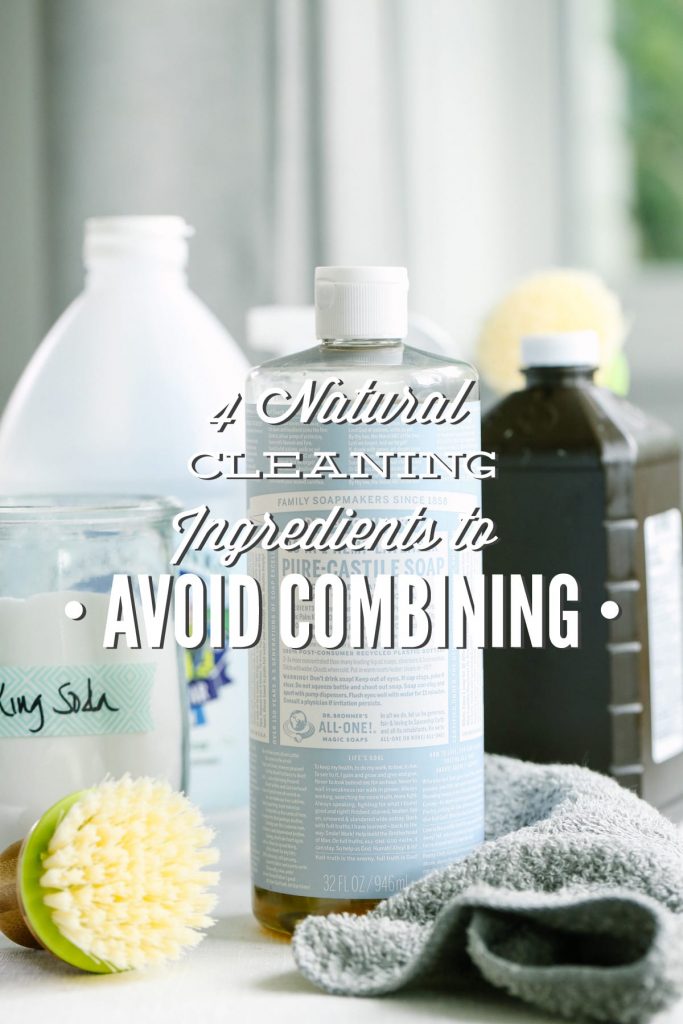
Want to Save This Article?
Enter your email & I’ll send it straight to your inbox. And you’ll get new recipes & tips each week.
While homemade cleaning products are family-friendly and safe to use in a home, there are a few precautions that need to be taken when combining ingredients and using a homemade cleaner. Just because ingredients are natural doesn’t mean they can or should be used on every surface in your home, or can be mixed with other homemade cleaners or ingredients. Let’s take a look at a few of the precautions I recommend taking when making homemade cleaners:
1. Water Safety: Distilled (sold in stores) or boiled and cooled water is best to use for long-term products. This process removes contaminants. Tap water should be boiled for 15 minutes. Clean tap water is okay for short-term use products.
2. Use Your Senses: If you ever notice a slime or an unusual odor in a bottle filled with homemade cleaner (or any product, whether homemade or store-bought) toss the cleaner and make a new batch.
3. Label Products: Always label a product that you plan to store for later with the product name and date. A simple label can be made with tape or writing with a permanent marker on glass spray bottles and containers.
4. Use Clean Tools: Always use clean spray bottles, containers, and/or mixing tools when making homemade cleaners. Bacteria is usually introduced into homemade products when the handling materials haven’t been properly cleaned.
5. Always Spot Test: With any cleaner that’s applied to a special surface, always spot test. This applies to both store-bought cleaners and homemade solutions. For cleaners that are used on special surfaces, like floors, wood, or counter-tops, I recommend first spot testing in a small, inconspicuous area.
6. Avoid Mixing Certain Natural Ingredients: Even though the ingredients used to make homemade cleaning products are safe, there are a few ingredients that shouldn’t be mixed together due to chemical reactions. Since there are many recipes all over Pinterest and the internet, many of which contain ingredients that don’t “play” well together, it’s important to understand the basic chemistry (without boring chemistry language, sorry science lovers) of why some ingredients shouldn’t be combined when making homemade products.
Natural Cleaning Ingredients to Avoid Combining
Let’s take a detailed look at four natural ingredients with combination issues. Each ingredient can be safely combined with other ingredients; there are just three notorious combos, using four different products (baking soda, hydrogen peroxide, vinegar, and castile soap) which should be avoided due to chemical reactions.
You may notice that in each ingredient combination (below) one major ingredient plays the role of the trouble-maker: vinegar! Vinegar is like the family member or friend who doesn’t get along with everyone, and always creates drama with specific people. We don’t know anyone like that, right?! Just an example, my friend.
Vinegar gets along with many natural ingredients, but when it comes to hydrogen peroxide, castile soap, and baking soda, she just doesn’t want to play nice. And when we ask her to play nice, she always makes a scene and creates drama (AKA: a chemical reaction). What a drama queen!
Combination 1: Vinegar + Baking Soda
This combo is common in recipes on the web and even some cleaning books. When combined, vinegar (an acid) and baking soda (a base) fizz (the reaction) and cancel each other out, which is an awesome science experiment for the kiddos. This fizz is caused by a chemical reaction, resulting in basically salty water which neutralizes the cleaning power of both ingredients. Now, salt is used in some of my favorite cleaning recipes, so I’m not saying salt is bad. If you want salt water come visit my family in Florida, just don’t mix vinegar and baking soda with the hope of making an awesome cleaner.
Baking soda and vinegar can help unclog a drain, but my guess is that their effectiveness is more about the chemical reaction that occurs when the ingredients are poured down the drain.
Alternative:
Baking soda and vinegar are wonderful cleaning or disinfecting ingredients, so they may be used back to back when cleaning, just don’t combine them into one cleaner.
Combination 2: Vinegar + Castile Soap
This is another very popular recipe combination. Just like vinegar and baking soda, vinegar and castile soap aren’t hazardous when combined, but the result will be an oily and expensive waste of ingredients.
When combined, vinegar (an acid) and castile soap (a base) cancel each other and create unsaponified soap. This reaction reduces the soap back to its original oils. If you try mixing the two ingredients you’ll immediately notice the castile soap curdles and feels very oily.
Alternative:
Sal Suds, unlike castile soap, can be combined with vinegar since it’s a detergent with a different chemical composition than castile soap.
Combination 3: Vinegar + Hydrogen Peroxide
Vinegar and hydrogen peroxide are both good disinfectants, so why not combine the two for a double POW? Well, the answer is simple: peracetic acid. Peracetic acid is highly corrosive, although its toxicity is low, and can cause irritation to the skin, eyes, and may even cause asthma (source). Sounds a lot like bleach, which is the reason why some recipes online combine the ingredients.
Alternative:
Hydrogen peroxide and vinegar can be used back to back to disinfect surfaces (like a cutting board), but shouldn’t be combined into one solution. Personally, I just use a hydrogen peroxide or straight vinegar spray when I need to disinfect a surface. To make a bleaching solution, I use washing soda and hydrogen peroxide (see my recipe).
With these safety precautions in mind, go ye forth and make homemade cleaners!

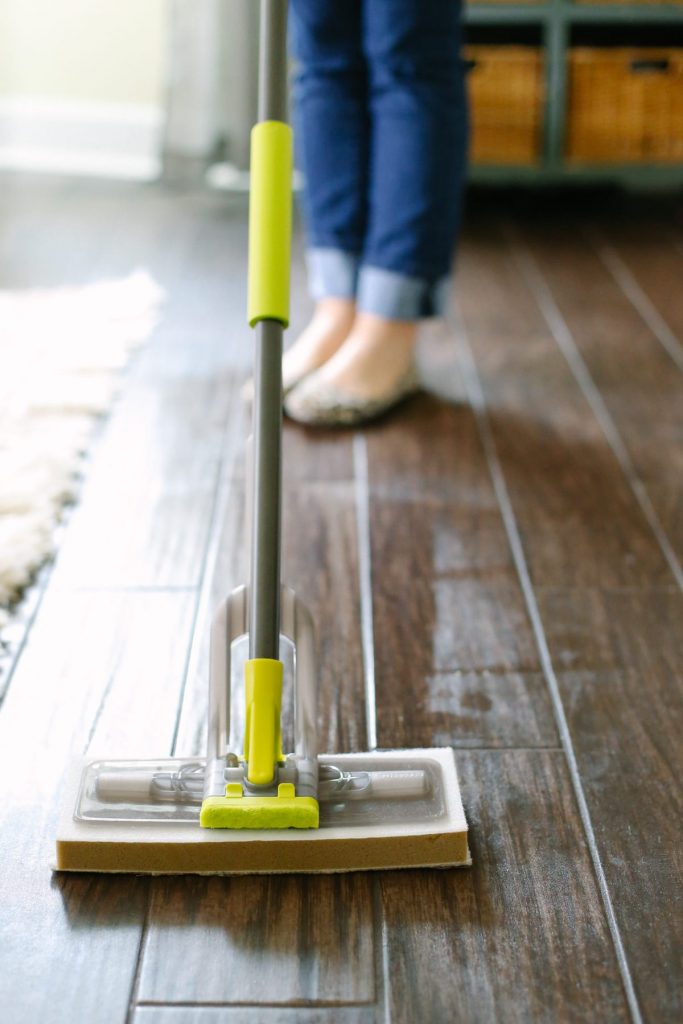
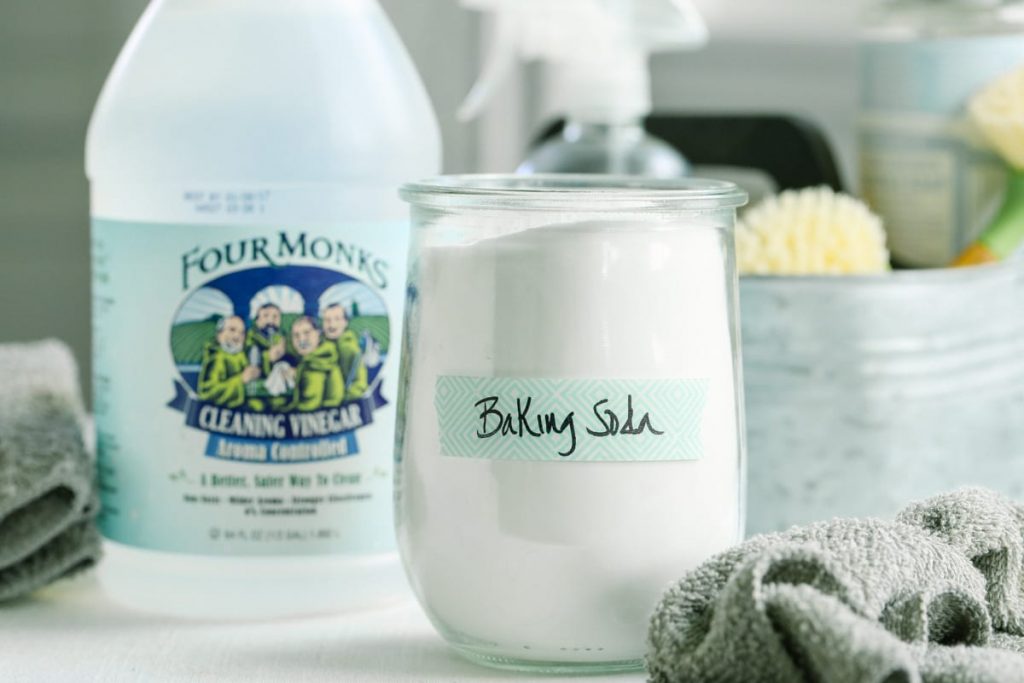
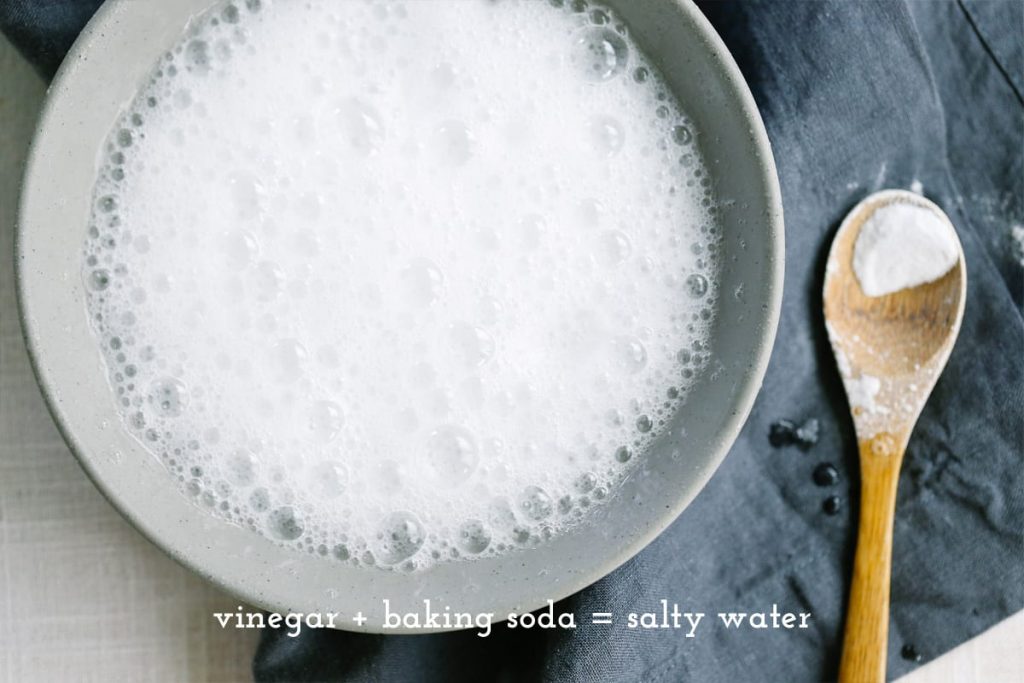
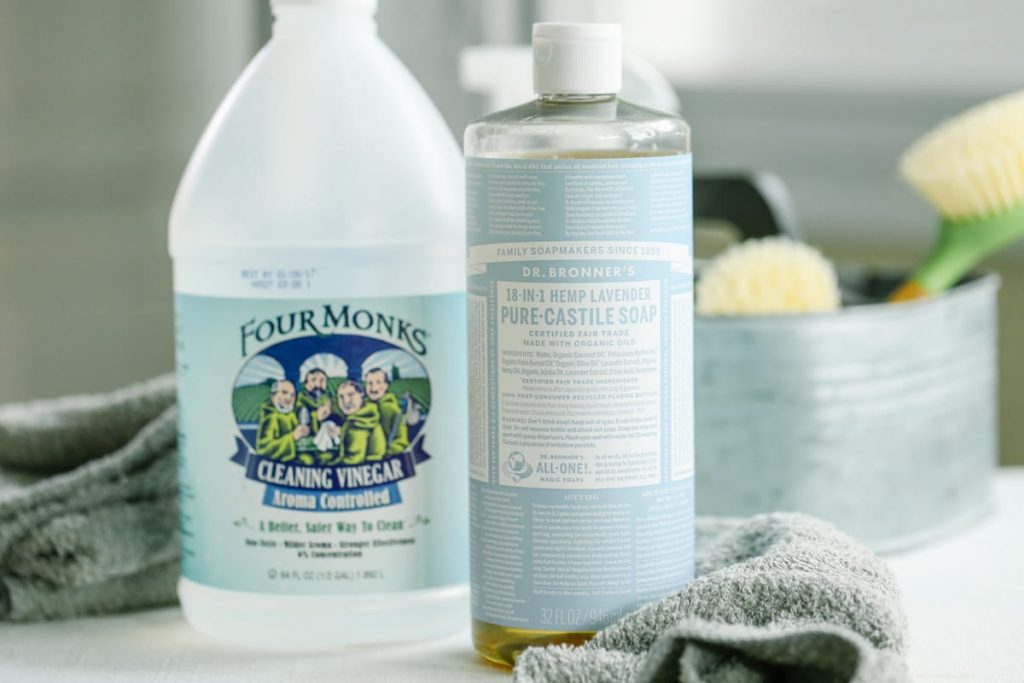
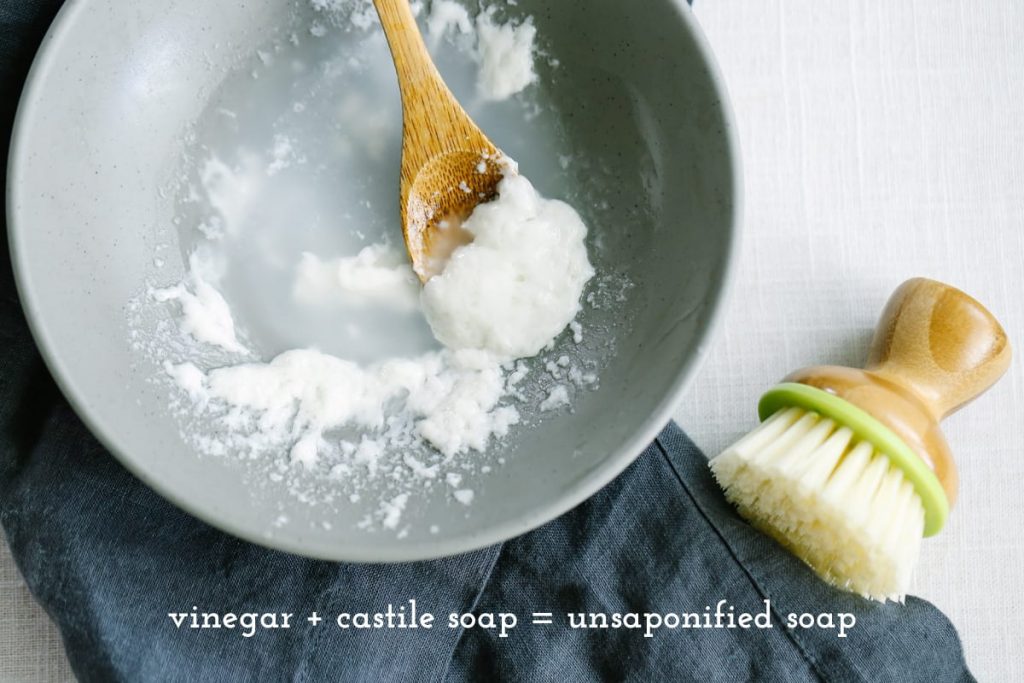
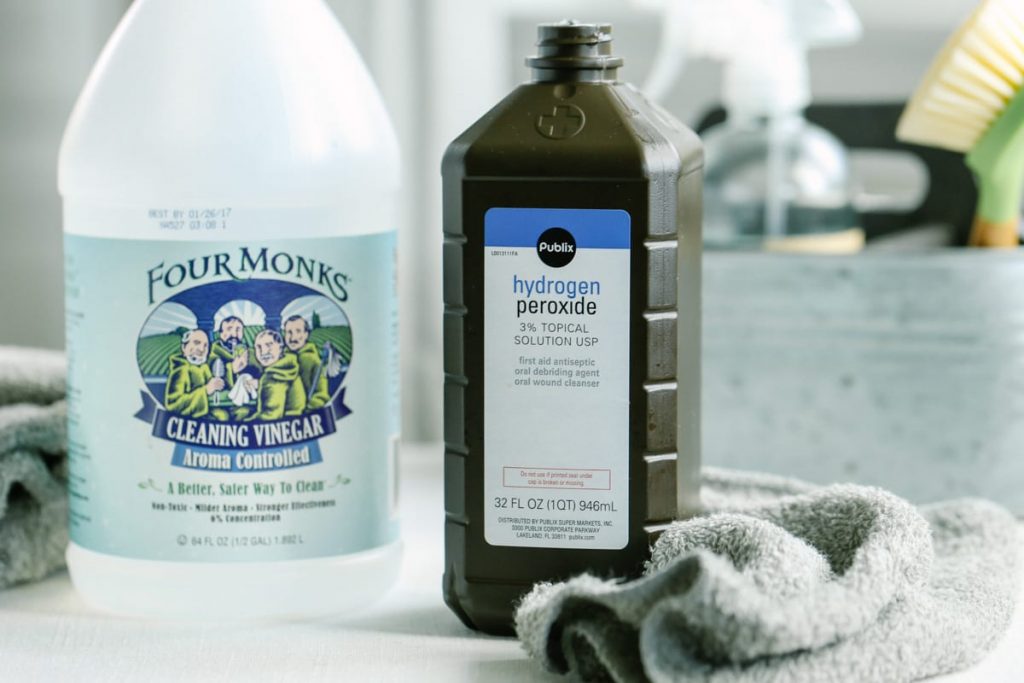
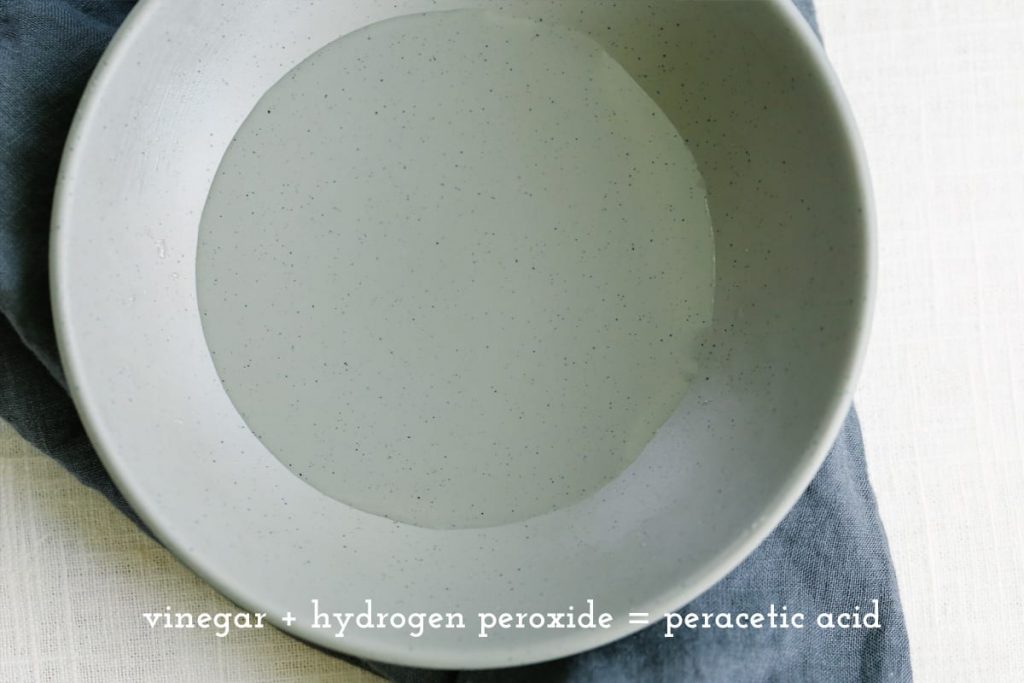
Hi Kristin,
Thanks for the great tips!
Quick question, I’ve read a lot on Castile soap and Apple Cider vinegar mixed and used as a natural shampoo for hair. And since you do not recommend mixing white vinegar with castile soap, I was just wondering if it is the same for apple cider vinegar too. WIll this mix also cancel each other out and leave a white residue instead of cleaning my scalp?
Hi there,
Yes, it will act the same. Vinegar is an acid and Castile soap a base so they will cancel each other. You could try using them separately.
LS Team
Hi Kristin,
Love ur recipes!
Just a quick qn , I used 1tb vinegar into dish soap with castille soap as I dont have Sal Suds, is this wrong to do? Should I throw out the mixture?
Thank you, so glad you’re loving the recipes. I don’t recommend mixing the two, but if it works I would use it up.
LS Team
Do you know if hydrogen peroxide loses its antibacterial properties when combined with Castile soap? I want to add it to my Castile hand soaps that I make at home.
Hey Lille, I don’t, but you’ll want to keep the mixture in a dark bottle. Hydrogen peroxide shouldn’t be exposed to light.
Love this. Thank you for the info. I have a question I recenty found a recipe that calls for blue Dawn and vinegar to be combined to use as a shower cleaner. Are these two a safe combination?
Hey Jennifer, I’m not sure, but I believe so. Dawn is more of a detergent I believe versus soap so vinegar should be okay if this is true. I would call Dawn and ask about combining the two.
Thieves cleaner: Water, Alkyl Polyglucoside, Sodium Methyl 2-Sulfolaurate, Disodium 2-Sulfolaurate, Thieves [Eugenia Caryophyllus† (Clove) Bud Oil, Citrus Limon† (Lemon) Peel Oil, Cinnamomum Zeylanicum† (Cinnamon) Bark Oil, Eucalyptus Radiata† Leaf Oil, and Rosmarinus Officinalis† (Rosemary) Leaf Oil], and Tetrasodium Glutamate Diacetate.
†100% pure, therapeutic-grade essential oil
Hi Kristin thank you for answering my post. Young Living is a brand of essential oils and they have a lot of products, one of my favorites is the Thieves Household Cleaner. I love it! But want to have more antibacterial properties added to it without it being harmful. Check out http://www.youngliving.com
Hi! Can I combine the Young Living Thieves cleaner with Hydrogen peroxide in the same bottle? If I can’t, could I use one after the other?
Thanks for your help!!
Hey Natalie, I don’t know what’s in the YL Thieves cleaner so I’m not sure.
Thank you for posting this. I have a question about the safety and/or effectiveness of Sal Suds and hydrogen peroxide? I am new to Sal Suds and am not too familiar with its ingredients. Thank you!
Hey Jamie, Sal Suds is a cleaner made by Dr. Bronner’s. The best information about Sal Suds is on this site: http://www.lisabronner.com/sal-suds-or-castile-soap-which-one-should-you-use/. Here’s more about hydrogen peroxide: https://en.wikipedia.org/wiki/Hydrogen_peroxide
Hi Kristin,
I just wanted to check this combo :
My current laundry detergent consists of baking soda, sea salt, castille soap, and some essential oils. But I find that I need to add something to whiten … can I add a cup of hydrogen peroxide to the wash?
Thanks
Julie
Hi Kristin, can you comment on this?
Hey Julie, I apologize for missing your comment. I think you could definitely add hydrogen peroxide if the clothes are all white. It may cause color issues for anything that’s not white.
Hi Kristin, can I combine castile soap with baking soda as a shampoo?
thank you!
Hey Laurel, I don’t know how well it work, but you could try!
Hi Kristin, It’s me again. This post had me laughing!!! But such good advice. Many thanks!
I also wanted to let you know how much I love your photos. They are fantastic! You have many talents, my friend 🙂
Sue
Thank you so much, Sue! Lol, I laughed a few times while writing it, too. Sometimes inspiration really hits ;).
Hi Kristin, have you heard anything about alcohol and vinegar combination as a desinfectant? My husband detests the smell of vinegar so I make a concoction of alcohol, vinegar and essential oils to tone it down although he can still smell it, it is less offensive.
Hey Mona Lisa, From my reading and research, alcohol and vinegar are okay. We have a couple of recipes on the blog that combine both ingredients :).
As I’ve been searching the web for recipes for all purpose cleaner, many call for vinegar and baking soda. I kept thinking back to high school chemistry and thinking, doesn’t that cancel each other out? Glad you made this post–I’m interested in disinfecting along with cleaning and will be looking at your recipes next!
Hey Ashley, Yep, you’re right! And there are so many recipes out there that call for this combination. I hope you find some recipes here on the blog to help with the cleaning and disinfecting. Let me know if you need a recipe or ideas :).
Hi Kristin! I just realized this ia a very late comment but I do have a question for you. I just started using natural products for cleaning purposes in my house. For laundry, I put washing soda in the detergent department and put white vinegar (sometimes apple cider vinegar) in the softener department. So using these two in washing machines cancel out their cleaning properties???? If so what should I use for fabric softener? Thank you so much!
Hey Durdane, As long as the two ingredients aren’t combined when you add them to the departments, which it sounds like they aren’t, then I think this combo is okay. My guess is that they’re probably being released into the washer at different times. I would continue to use them.
Hi Kristen. What a timely blog post. I am ready to make some more fabric softener for my HE front loader and am wondering If I could add vinegar in with Epsom salts and essential oil. I’ve found that in using baking soda and salt, that it doesn’t dissolve in the fab softener tray of the machine. I’ve changed over to using a hottest water wash and hot rinse but found the tray was still partially blocked and filled with water at the end of the wash.
Thanks for all the great info.
Hi Kristin,
I love your DIY tips with natural products! I am new to using natural products and wondering if apple cider vinegar is the same as white vinegar for cleaning? I found that apple cider vinegar does wonders to remove hard water stains, but does it disinfect too?
Hey Monica, I believe, based on my readings, you can use apple cider vinegar versus white vinegar for disinfecting. Apple cider vinegar contains acetic acid, so it should work well. I personally would use the undiluted vinegar back to back with a hydrogen peroxide spray in the kitchen (for disinfecting something like a cutting board).
OMG you had me dying with this one “Vinegar is like the family member or friend who doesn’t get along with everyone, and always creates drama with specific people. We don’t know anyone like that, right?!”
i could not stop laughing….
Lol, I’m glad you liked that part ;).
hi, m name is Vinegar lol
What do you use for your liquid fabric softner (in washing machine)?
Hey Donna, I use salt (dry), but I’ve also used 1/2 cup of vinegar with really good success. You can either add the vinegar to a Downy Ball or during the rinse cycle.
Thank you for the wonderful info! I read that vinegar and peroxide not combined in the bottle but sprayed on one after the other is more powerful than bleach for killing germs so I use it on my toilets. 2 boys that can’t ever seem to hit their target are a call for desperate measures. 🙂 2 questions-whats the best for shower mold-vinegar, peroxide or castile soap? I’m using castile soap deluded on my shower tile right now and it cleans wonderfully but is it killing the mold? Also, do you think your dishwashing soap recipe would do well to get rid of the hard water on my shower glass?
Brandi
Ok one more question-is your book still being released on Sunday? 🙂
Hey Brandi, I’m so glad the info was helpful! Yep, vinegar and hydrogen peroxide are great to use back to back when disinfecting a surface (I’ll spray one, wait, then wipe, and followup with the second ingredient).
We ended up pushing the book back to 11/27 (Black Friday!). This book is a beast–so much info and tons of recipes, so initially we left some content out because it’s so big, but last week we decided the info and recipes are really important, so we decided to delay the release by a week to add the info/recipes (the table of contents needed an update and space had to be made in the design for the extra info). Here’s the information page for the book: https://livesimply.me/diy-natural-cleaning/. On the 27th we will send out an email to all subscribers letting them know the book is up for sale and offer a subscriber-only coupon code, so if you’re on the email list look for that email :). I’m so excited to finally get this resource out!
For the bathroom, castile soap is an amazing cleaner, but doesn’t disinfect. Hydrogen peroxide is a great disinfectant. You can use both! You could use the bathroom cleaner: https://livesimply.me/2014/09/28/diy-homemade-bathroom-cleaner/ and then followup with a hydrogen peroxide spray (just attach a spray nozzle to a hydrogen peroxide bottle). This formula will clean and then disinfect. If you’d like a daily shower spray, you could use 1/4 cup vinegar, 1/2 cup vodka, 2 cups water, and an essential oil–tea tree would be great! (if you don’t mind the vinegar smell). You could also add a few drops of Sal Suds to the solution (since castile soap would react with the vinegar ;).
I have two dish soap recipes in the book! The one here on the blog might work for hard water spots on the shower glass (you’ll definitely need to give it a good rinse due to the Sal Suds), but I think the second one has a better possibility. I’m happy to share the recipe if you’d like to give it a shot on the glass, email me: [email protected]). Another option would be to try the window cleaner here on the blog: https://livesimply.me/2015/11/09/how-to-make-homemade-glass-and-mirror-cleaner/.
Thank you for all of that incredible info! I checked out the link and I’m very excited for your book. I will will wait patiently for it instead of bugging you for a recipe early. 🙂 I will definitely try the options you recommended!
Thanks again!!!
Thank you for the tips! I tried making toilet bowl cleaner with hydrogen peroxide + liquid Castile soap + baking soda. It cleaned well but expanded a lot (trippled) in the container. Do you know if that combination is another no-no?
Hey Aileen, You’re welcome :). Hydrogen peroxide and baking soda produces a gas buildup so the mixture just needs venting. The expansion was due to the gas building up without a place to go.
Would it still be an effective cleaner without the baking soda? Thanks.
Hey Terri, Which cleaner are you referencing?